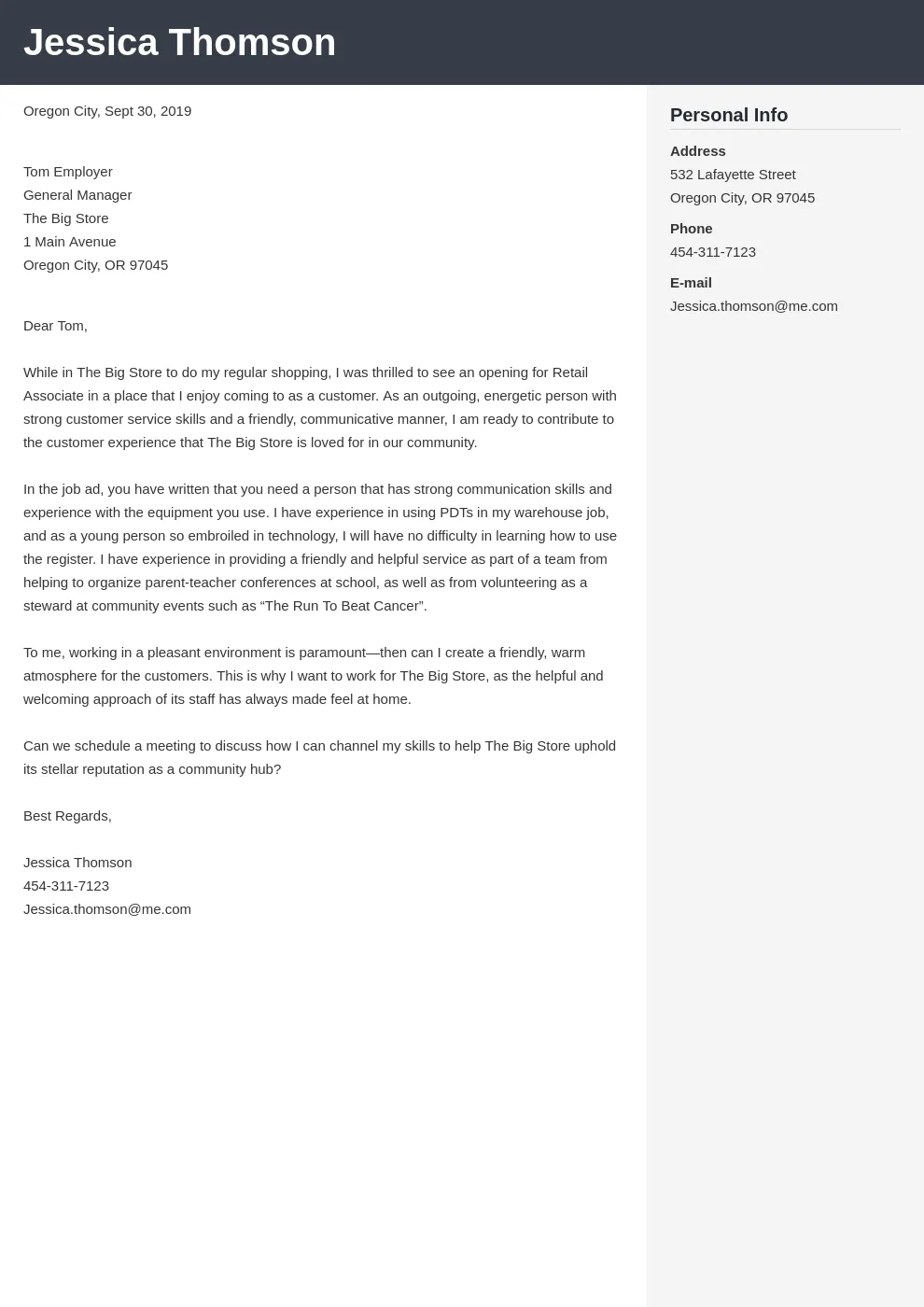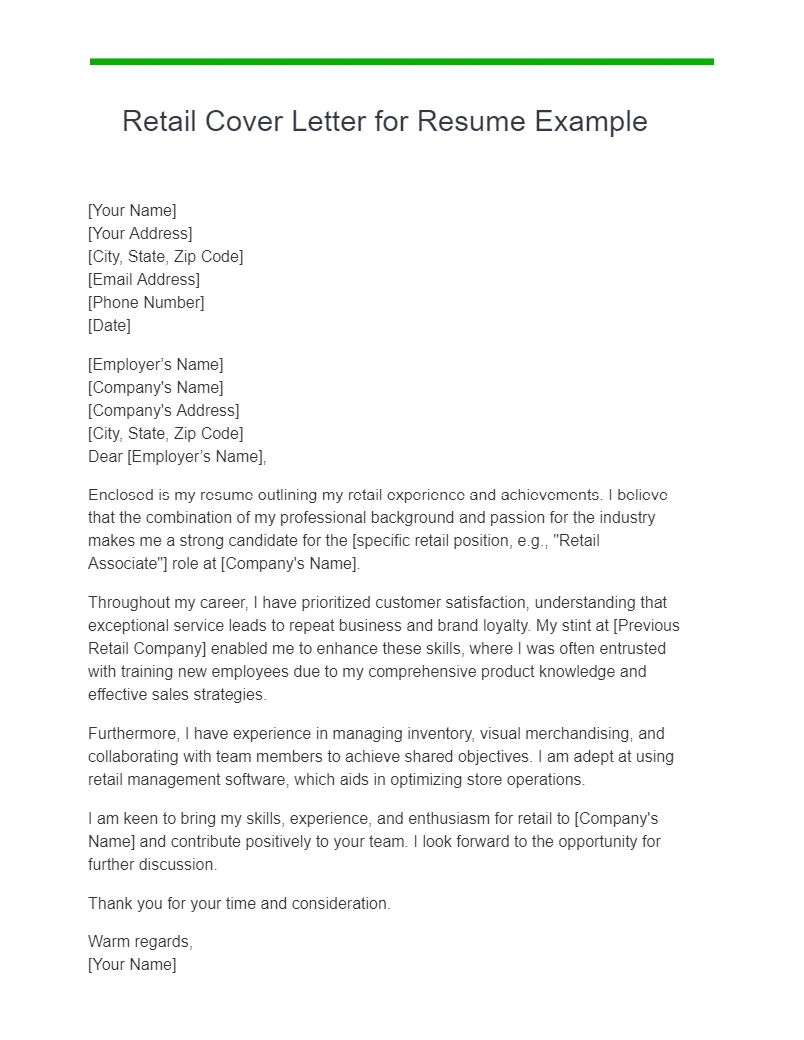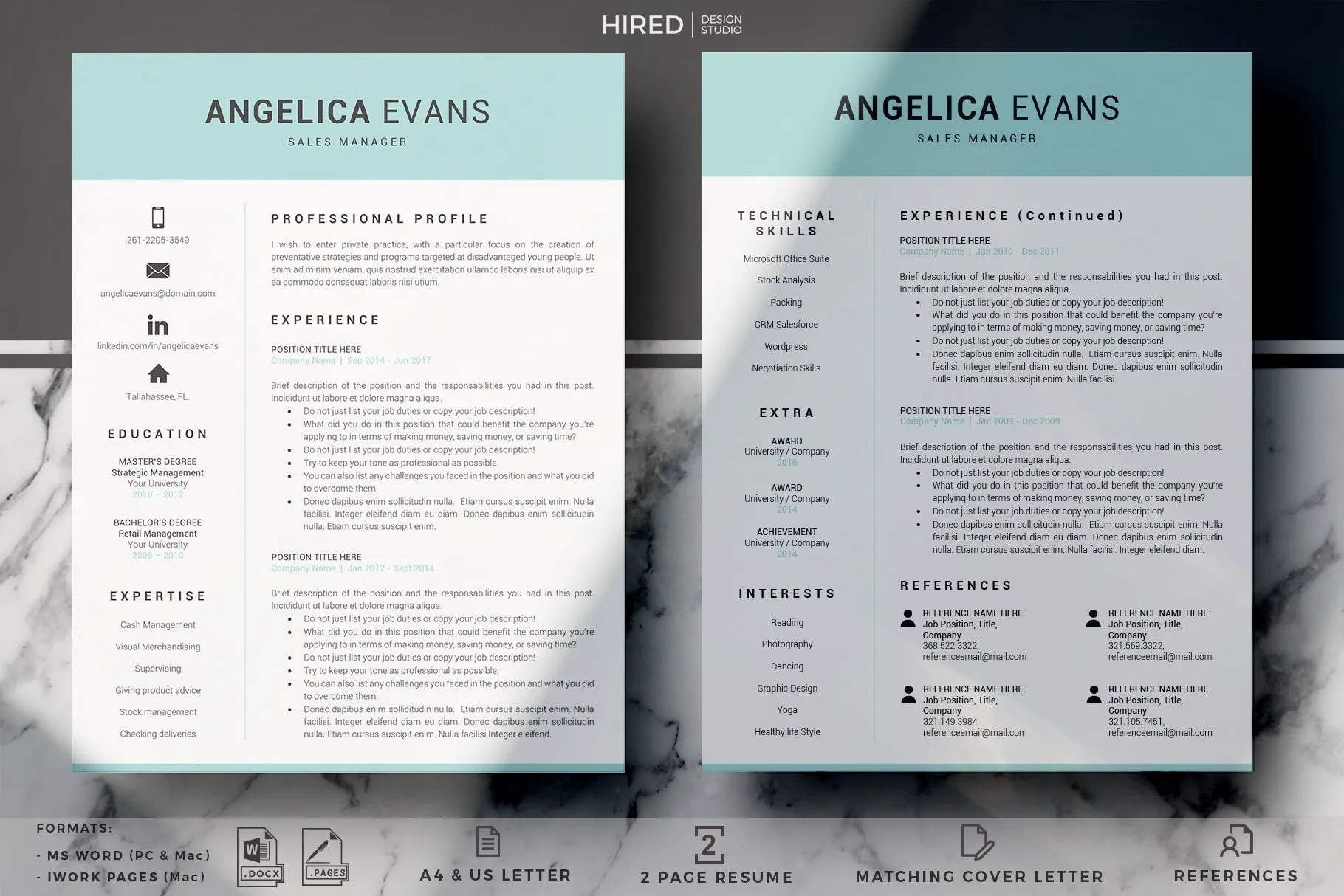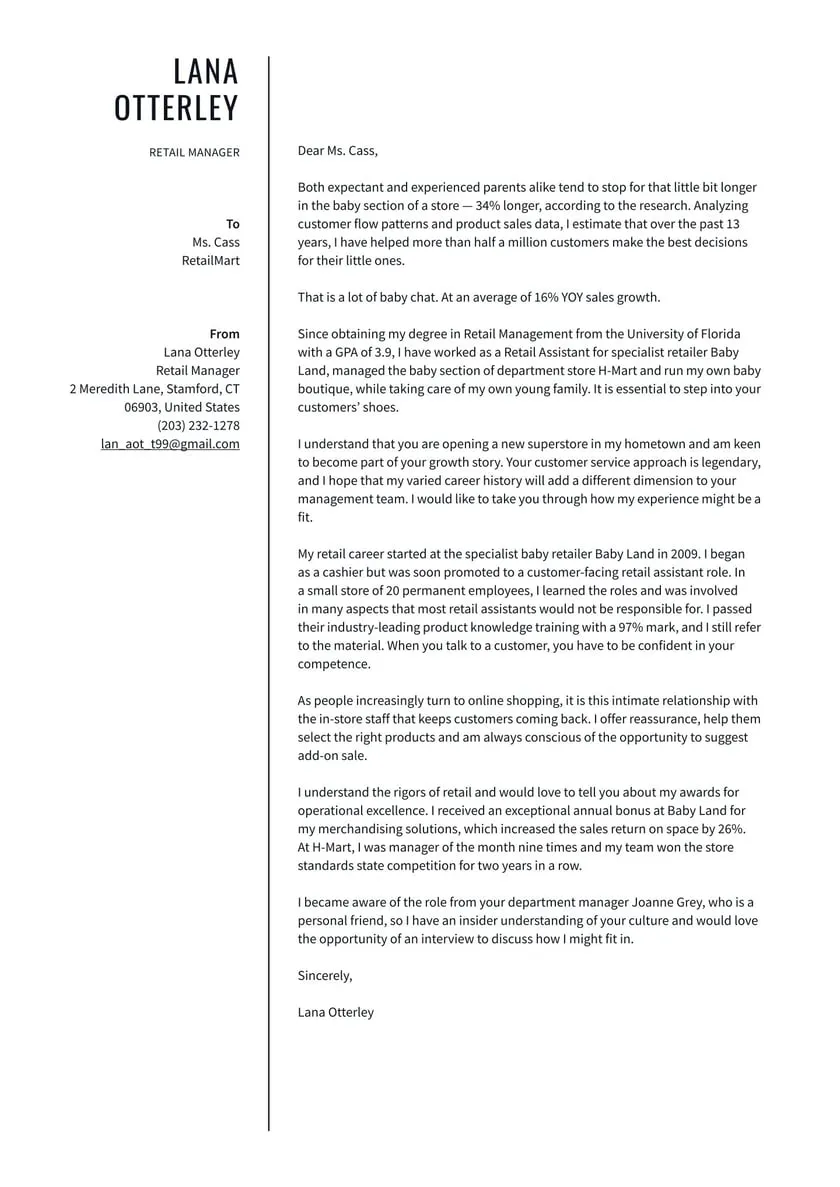Why a Retail Cover Letter Matters
In the competitive world of retail, a well-crafted cover letter can be your secret weapon, setting you apart from other applicants and significantly boosting your chances of landing your dream job. Often overlooked, a cover letter provides a unique opportunity to showcase your personality, enthusiasm, and relevant skills beyond what’s listed on your resume. A compelling cover letter allows you to personalize your application, demonstrating genuine interest in the specific role and the retail company you’re applying to. It’s a chance to tell your story, explaining why you’re the ideal candidate and how your experience aligns with the company’s values and goals. Without a cover letter, you risk appearing like a generic applicant, easily lost in a sea of resumes. Retail managers value candidates who take the initiative to go the extra mile, and a thoughtfully written cover letter is proof that you’re willing to invest the time and effort to make a strong impression. This is your chance to introduce yourself and make a memorable first impression before you even walk into the interview room.
Highlighting Your Retail Skills
Your cover letter is the perfect place to showcase your core retail skills, which are often more nuanced than just stating you have them. Instead of simply listing skills, provide specific examples of how you’ve utilized them to achieve positive outcomes. For instance, instead of saying “I have strong customer service skills,” you could write, “In my previous role at [Previous Company], I consistently exceeded customer expectations by proactively addressing their needs, resulting in a 15% increase in positive customer feedback.” Emphasize skills such as communication, problem-solving, sales, teamwork, and time management. These skills are essential in retail environments, and highlighting your ability to effectively use them will make you a highly desirable candidate. Tailor your skill set to match the specific requirements of the job description. If the job requires strong cash handling experience, provide concrete examples of your accuracy and efficiency in handling transactions. If the role focuses on visual merchandising, showcase your experience in creating appealing displays that boosted sales. By emphasizing the right skills with supporting examples, you demonstrate your ability to contribute positively to the company’s success.
Showcasing Relevant Experience

Use your cover letter to spotlight your retail experience in a way that resonates with the hiring manager. Focus on specific accomplishments rather than simply listing job duties. Quantify your achievements whenever possible; for example, mention how you increased sales, reduced shrinkage, or improved customer satisfaction scores. Describe the context of your experience: the company, the role, and the time frame. This helps the hiring manager understand the scope and relevance of your background. If you have experience in a similar role, highlight those responsibilities. If you are new to retail, emphasize transferable skills from other fields, such as customer service, teamwork, and problem-solving. Don’t just state what you did; explain how you made a difference. This could include training new employees, implementing new processes, or resolving difficult customer issues. This approach demonstrates your ability to contribute from day one. Use action verbs such as “managed,” “achieved,” “implemented,” and “improved” to describe your achievements, which adds impact to your statements and makes your experience more compelling.
Tailoring Your Cover Letter to the Job
One of the most critical elements of a successful retail cover letter is tailoring it to the specific job and company. This involves carefully reading the job description and identifying the key requirements and desired skills. Use the language and keywords from the job posting in your letter to demonstrate that you understand the role and what the company is looking for. Research the company and its values to align your skills and experience accordingly. If the company emphasizes customer service, showcase your experience in resolving customer issues and exceeding expectations. If the job requires specific skills like inventory management or point-of-sale (POS) systems, highlight your proficiency in these areas. Generic cover letters do not work. Each cover letter should be customized to reflect the particular opportunity and the retail brand you are targeting. Show that you understand what the company does and why you are a good fit for their team, not just any retail position. This will help you stand out from the crowd of applicants who send the same letter to every company.
Retail Cover Letter Formatting
Formatting your retail cover letter correctly is essential for making a positive first impression. Your cover letter should be well-organized, easy to read, and free of errors. Use a professional-looking font such as Arial, Calibri, or Times New Roman, and keep the font size between 10 and 12 points. Maintain consistent formatting throughout the document, including line spacing, margins, and paragraph indentation. Begin with your contact information at the top, followed by the date and the hiring manager’s contact information. Use a clear and concise structure, with a strong opening paragraph, compelling body paragraphs, and a professional closing. Break up the text into manageable paragraphs, each addressing a specific point. Use bullet points or numbered lists to highlight your skills, accomplishments, and experience when appropriate. Proofread your cover letter carefully for any spelling, grammar, or punctuation errors. A well-formatted and error-free cover letter demonstrates your attention to detail and professionalism, which are highly valued in the retail industry.
Essential Elements of a Strong Retail Cover Letter

A strong retail cover letter contains several essential elements that work together to make your application stand out. Start with a compelling opening paragraph that grabs the hiring manager’s attention and states your purpose for writing. Mention the specific role you are applying for and where you found the job posting. In the body paragraphs, highlight your relevant skills and experience, providing specific examples of your achievements and quantifying your results whenever possible. Tailor these examples to match the requirements of the job description. Demonstrate your knowledge of the company and its values, explaining why you are a good fit for the team. Express your enthusiasm for the opportunity and your interest in the company. The letter should convey your understanding of the retail environment. Use action verbs to showcase your skills and accomplishments, as well as keywords from the job description. Close your cover letter with a strong call to action, such as stating your availability for an interview and thanking the hiring manager for their time and consideration.
Contact Information and Salutation
Begin your retail cover letter with your contact information, including your name, address, phone number, and email address. Ensure that your email address is professional and appropriate; avoid using nicknames or informal addresses. Place your contact information at the top of the document, typically left-aligned. Following your contact information, include the date and the hiring manager’s contact information, if available. This information should include the hiring manager’s name, title, and the company’s address. If you cannot find the name of the hiring manager, address the letter to “Hiring Manager” or “Recruiting Team.” Use a formal salutation, such as “Dear Mr./Ms./Mx. [Last Name]” or “Dear Hiring Manager.” If you don’t know the hiring manager’s name, do your best to find it. This shows that you have done your homework. Proper formatting and a professional tone in this section set the stage for a well-received cover letter. It highlights that you can follow instructions and pay attention to details, qualities highly valued in retail.
The Body Paragraphs
The body paragraphs are the heart of your retail cover letter, where you articulate why you’re the ideal candidate. Structure your body paragraphs strategically to highlight your skills, experience, and accomplishments. Start by stating the specific role you’re applying for and how you learned about the opening. The next section should showcase your most relevant skills, referencing your prior experience with concrete examples. Provide specific examples of how you’ve used these skills to achieve positive outcomes. Quantify your achievements by using numbers. For instance, “Increased sales by 15% in the first quarter.” Mention specific systems or tools you have used, for example “Expert in POS systems.” Tailor your examples to match the job requirements described in the job posting. This shows the hiring manager that you’ve read the posting and understand the needs of the role. In the final body paragraph, express your enthusiasm for the opportunity and explain why you’re interested in working for that specific company. Conclude with a brief statement of your key strengths and how they align with the company’s values. By following this structure, you create a compelling and convincing narrative that makes you an attractive candidate.
Closing Your Cover Letter

The closing paragraph of your retail cover letter should leave a lasting positive impression. Reiterate your interest in the position and your enthusiasm for the opportunity. Clearly state your availability for an interview and express your willingness to discuss your qualifications further. Thank the hiring manager for their time and consideration. Use a professional closing, such as “Sincerely,” “Best regards,” or “Thank you,” followed by your typed name. Avoid generic or overly casual closings. Before submitting your cover letter, review it to ensure it is free of errors and tailored to the specific job. Remember to keep it concise, professional, and enthusiastic, showing the hiring manager that you are ready to take the next step in the hiring process. By concluding with a strong call to action and a sincere expression of gratitude, you leave a lasting positive impression.
Proofreading and Editing Your Cover Letter
Proofreading and editing your retail cover letter is a non-negotiable step in the application process. Errors in spelling, grammar, or punctuation can undermine your credibility and make you appear unprofessional. Before submitting your cover letter, carefully review it for any mistakes. Read the document aloud to catch errors you might miss when reading silently. Use a spell checker and grammar checker, but remember these tools are not perfect. They may not catch all errors, so proofread manually. Check for clarity and conciseness. Make sure your sentences are well-structured and easy to understand. Ensure that the tone of your cover letter is professional and enthusiastic. Consider asking a friend, family member, or career advisor to review your cover letter. A fresh pair of eyes can often catch mistakes that you might have missed. By taking the time to proofread and edit your cover letter, you demonstrate your attention to detail and your commitment to presenting yourself in the best possible light.
